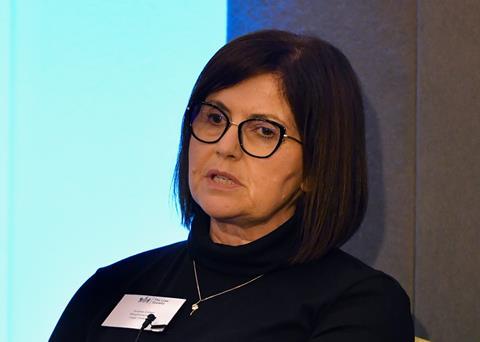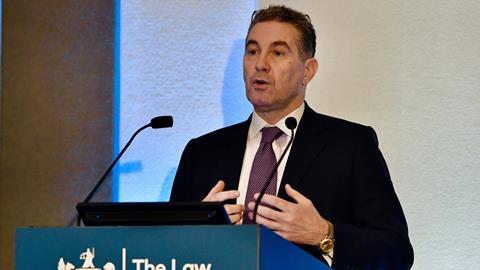Law firms and the regulator are ‘playing catch-up’ on anti-money laundering. ‘Government pressure is colossal,’ SRA chief executive Paul Philip warned solicitors at the annual risk & compliance conference
Given the multitude of requirements facing law firms on anti-money laundering, some compliance officers may not have had time to properly digest SRA chief executive Paul Philip’s latest warning shot to the profession. Those that did probably needed a lie down.
Philip’s key message to last week’s annual Law Society risk & compliance conference was twofold: there will be no let-up in the regulatory burden of preventing money laundering – and it is not the SRA’s fault.
Philip explained that the most common request from firms when asked how the SRA can help is to stop adding to the AML regulatory burden, but that is not possible for now.
‘The reality is we are piggy in the middle,’ he said. ‘Do we think there is a problem [for firms]? Absolutely. The vast majority of legal practices in England and Wales are in a relatively small business unit and I suspect – in fact I know – most people are just trying to catch up and be aware of what their obligations are.
‘For those firms you have nothing to fear from us. We will do our best to provide guidance.
‘There is nothing we can do to stop the onslaught of regulatory requirements coming from direct legislation which we are forced to implement. Arguably we are playing catch-up as we should have been doing this sort of thing a long time ago.’
The implications of getting AML obligations wrong are severe, reputationally and financially. More than a dozen firms have been fined in the last year for having insufficient risk assessments to present to SRA inspectors. In January, the regulator flexed its new fining powers to impose a record £20,000 penalty on a firm for failing to have adequate AML training and internal systems.
'The vast majority of legal practices in England and Wales are in a relatively small business unit and I suspect – in fact I know – most people are just trying to catch up and be aware of what their obligations are'
Paul Philip, chief executive, Solicitors Regulation Authority
There is also potential for further action, with a handful of cases in the last year where firms have been pursued for misleading the SRA – a charge likely to end up at the tribunal – by wrongly declaring they had all their AML ducks in a row.
Last June, the SRA imposed a new duty on 6,000 firms to provide data on the scale and potential risk of their work. Firms would be required to return a form with information on their exposure, covering areas such as the value of work conducted for their largest single client and how much higher-risk work they conduct.
Source of funds checks are proving to be a major burden. The SRA says firms should ‘go back as far as is needed’ to build a clear picture of how clients accumulated their money on the transaction.
The economic crime bill currently going through parliament will place more responsibility on the SRA to prevent money laundering, and Philip said the level of bureaucracy and regulation is likely to increase. The legislation will also give the SRA unlimited fining powers for firms that have facilitated economic crime.
‘Government pressure to drive through the economic agenda is just colossal,’ added Philip. ‘If we get those powers we would expect and would wish to use them. The level of fines for economic crime, particularly in the financial sanctions era, will increase radically.’
New burdens are emerging all the time, particularly as the government comes under pressure to enforce sanctions on Russian clients. There was even speculation at the conference that a ban on advising Russians altogether might be in the offing.
As of last December, UK government sanctions had prevented law firms from providing trust services to anyone connected to Russia, unless such arrangements are already in place.
Solicitors are entitled to ask why they rather than financial institutions appear to be on the frontline for this type of work. The SRA might also question whether it has the resources to police dirty money coming into the country when its budget is a fraction of that of the Financial Conduct Authority.
Under the Economic Crime (Transparency and Enforcement) Act 2022, overseas entities that own land or property in the UK are required to declare their beneficial owners and/or managing officers to the Companies House Register of Overseas Entities.
However, solicitors have been warned to think carefully before putting themselves forward to certify the accuracy of such submissions. ‘It is a serious undertaking,’ Dominic Sedghi, head of knowledge at City firm Macfarlanes, told the conference. He said that law firms risk committing a criminal offence. In guidance on the Register of Overseas Entities, the Law Society has warned that risks include possible criminal prosecution, regulatory sanction and reputational damage.
Analysis by client-verification system supplier Thirdfort suggests law firms are heeding such warnings. It found that 146 businesses have registered with Companies House to become UK-regulated agents who can complete verification checks on beneficial owners. Of these businesses, 27 are law firms – 0.3% of the 9,550 law firms in England and Wales.
Of the remaining 119 registered agents, 75 are accountancy firms and one is an estate agency. The rest are a mixture of company formation, wealth management or other financial services firms, Thirdfort said.
The government has said that only 19,510 registered overseas entities out of 32,440 had declared their beneficial owners before the 31 January deadline.
'The SRA’s words today were a warning sign. If you have not got everything sorted then that is your first job for Monday morning – check your policy'
Andrea Cohen, legal director, Weightmans LLP
Sedghi said that certifying the nature of a beneficial owner’s control poses particular risks. While it is theoretically possible to rely on information from the owner, ‘you have to be confident the information you have is true,’ which is ‘a very high bar’. Taking a ‘risk-based approach’ is not acceptable, he added.

Harriet Holmes, AML services manager at Thirdfort, described the register of overseas interests as ‘a positive step forward’. But with more than 10,000 entities having missed the registration deadline, ‘there is a significant amount of work to do and a big question mark on whether Companies House has adequate resources to deal with a large amount of non-compliant entities’.
All this is enough to send compliance officers running for the smelling salts (or perhaps something even stronger). But experts warn that a head-in-the-sand approach is the worst possible response.
Andrea Cohen, legal director at Weightmans LLP, told the conference that the SRA wants firms to know how seriously the regulator takes this issue. She urged firms to make sure every fee-earner is up to speed with AML policies and procedures, as the regulator is likely to want to speak to more than just managing partners and compliance personnel. Informing indemnity insurers is also a must if you are facing an investigation: ‘Don’t wait for them to read it in the Gazette,’ advised Cohen.
‘The SRA’s words today were a warning sign,’ Cohen added. ‘If you have not got everything sorted then that is your first job for Monday morning – check your policy.’
Mental illness should not be an occupational hazard
Junior lawyers must not be exposed to toxic working conditions simply because it is seen as a rite of passage, a junior lawyer told the conference.
Victoria Zinzan, a member of the Junior Solicitor Network Advisory Committee, said a balance needs to be struck between growing a thick skin to thrive in the law, and being subject to the type of conditions that cause mental health issues. Zinzan was speaking at a conference panel discussing workplace culture and the Solicitors Regulation Authority’s increasing interest in the area.

The regulator carried out a thematic review into workplace culture last year, and earlier this month said it would pursue any firm that creates a ‘pervasive toxic culture’ through the disciplinary process and where appropriate on to the Solicitors Disciplinary Tribunal.
Zinzan was asked whether junior lawyers should effectively ‘get on with it’ and accept that difficult working conditions are just part of starting out in the profession. She said there was a preconception that juniors had to be available 24/7, must impress their supervisor, and can never say they are working at capacity.
‘There’s a burnout crisis we’re starting to feel,’ she said. ‘Burnout isn’t just feeling stressed but something that needs to be taken extremely seriously. Mental health is just as important as physical health. Sometimes in our profession it’s a bit taboo to say we’re not feeling good mentally. We’re supposed to be lawyers and this is what we signed up for.’
She continued: ‘Just because we’re in a hard profession that doesn’t mean it’s acceptable to burn out and just get on with it. That isn’t an attitude anyone should have – anyone who has that attitude needs to take a step back and understand the reality. There’s a strong difference between working hard and burning out and almost killing yourself.’
Elizabeth Rimmer, chief executive of charity LawCare, said that just because the profession is tough does not mean it has to be toxic.

‘It’s incumbent on lawyers to improve the working practice, so it’s not like this in the future,’ she said. ‘People won’t sign up to come into the profession. There may be [a “get on with it”] attitude that’s pervasive, but we’re not coming into a combat situation and we shouldn’t need a hard hat to work in the industry.’
































4 Readers' comments